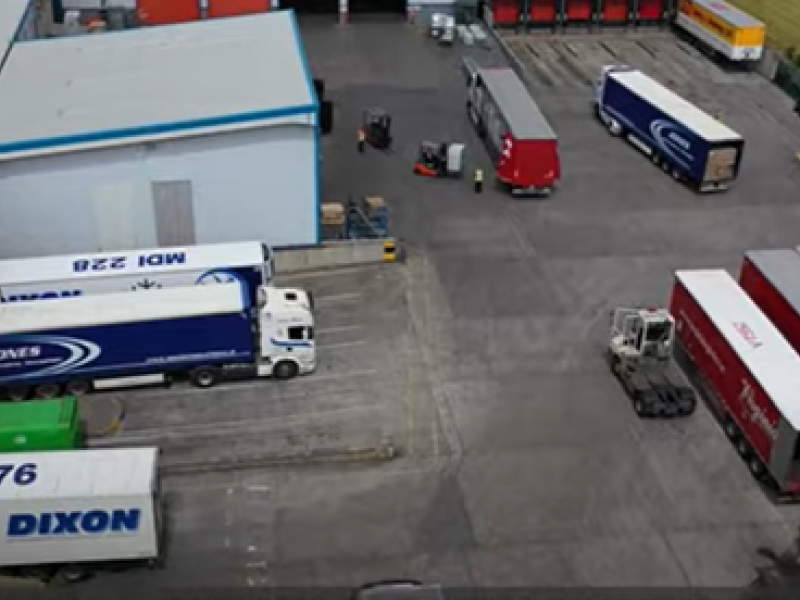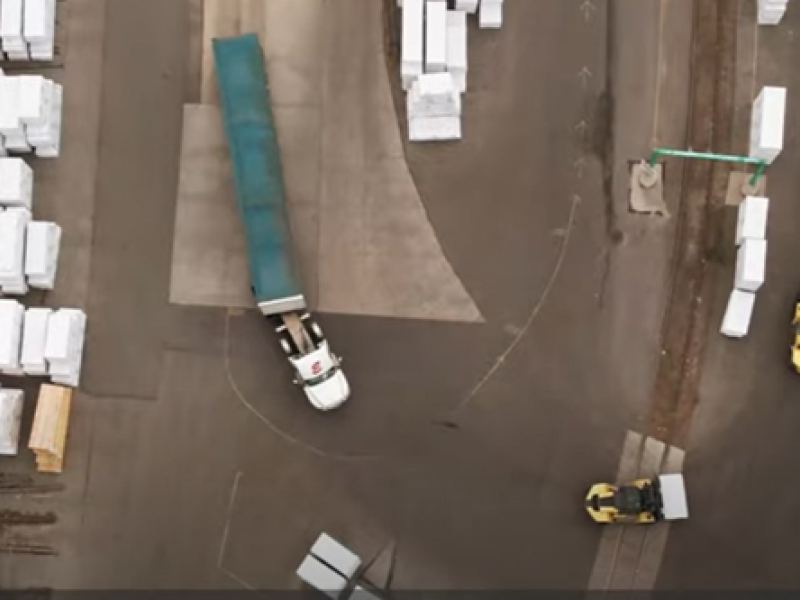Careers in Transport and Logistics
Introduction
The Transport and Logistics industry is a varied sector which has seen growth and change in Ireland in recent years. This has in turn raised the profile of the industry as an attractive environment for those entering the workforce and perhaps considering a career change. It is a very significant industry in the country with 103,000 employed nationally, including just over 40,000 in the Dublin region (Report by Logistics and Supply Chain Skills Group, 2020), and contains a broad range of career opportunities from warehouse management and truck driving, to working in customs administration and data analytics relating to logistics.
Also, the industry has seen an increase in complexity due to the challenges of Brexit, the pandemic and international conflict; all of this means that the demand for skilled and dynamic professionals in transport and logistics is likely to continue in the long term.
Learn more about careers in Transport and Logistics by clicking below:
Fingal Skills Strategy - Logistics Showcase - Aramex
Frank Kilbride, Country Manager at Aramex, located in Ballyboughal in the heart of Fingal, gives his view on broad trends in the sector in the above brief video.

Types of Companies
The diversity of activities within Transport and Logistics is demonstrated by the different types of firms providing services in the sector. These include:
Freight Forwarders – Freight Forwarders arrange the transport of cargo on behalf of their Clients. This can be exporting cargo to an international destination for an Exporter/ Manufacturer or arranging to bring materials from abroad to Ireland for an Importer who does not possess the skillset/ resources to carry out this complex work themselves. Freight Forwarders arrange for transport cargo by making arrangements with carriers and they also complete the required documentary paperwork.
Third Party Logistics Providers – These companies operate as outsourced logistics partners for companies to transport and store good s on their behalf. Therefore, they arrange warehousing and transport for the client company for an all-on cost.
Hauliers – Hauliers are companies which transport goods by road, typically using large lorries/trucks.
Shipping Companies – Shipping lines own and operate their own Container Ships to transport cargo by sea.
Shipping Agents – Shipping agents arrange for the use of a shipping line to transport goods to a although that line does not have a local branch office.
Customs Brokers – A customs broker provides administrative services for customs documentation to ensure goods can be transported out of or into a country.
Fingal Skills Strategy - Logistics Showcase - Irish International Freight Association
Seamus Kavanagh, Executive Officer, Irish International Freight Association, based in Swords, shares insights on the type of companies active in the sector locally.

Industry Skills and Qualifications
The Expert Group on Future Skills Needs reported in 2015 that there would be a probable demand for 30,000 new entrants within the sector from 2016-2025. The report highlighted key skills requirements including shortages of HGV drivers. Future skills gaps for drivers and warehouse operatives has also been highlighted by the Fingal Skills Strategy (2019).
Here is a selection of relevant qualifications in the Fingal / Dublin areas:
Third Level:
Technological University Dublin
- Bachelor of Science (Honours) Logistics and Supply Chain Management (Level 8 Full-time)
Logistics & Supply Chain Management / Loighistic ┐ Bainistíocht An tSlabhra Solá | TU Dublin
- Postgraduate Supply Chain Management (Level 9 Full-time/Part-time)
Supply Chain Management / Bainistíocht Shlabhra an tSoláthair | TU Dublin
- Bachelor of Science, Retail and Services Management (Level 8, modules on logistics and supply chain)
Retail & Services Management / Bainistíocht Miondíola ┐Seirbhísí | TU Dublin
- Bachelor of Science (Honours) Sustainable Transport Management (Level 8 Full-time)
Sustainable Transport Management / Bainistíocht Iompair Inbhuanaithe | TU Dublin
University College Dublin
- MSc Supply Chain Management (Level 9 Full-time/Part-time)
MSc in Supply Chain Management | MSc Ireland | UCD Smurfit School
Further Education:
Examples of courses available at Education and Training Boards (ETBs) include but are not limited to:
- HGV Professional Driver - HGV Rigid Truck Driving (fetchcourses.ie)
- HGV Driver – Articulated Trucks - Skills to Compete - Heavy Goods Vehicle Driving - Articulated Truck (fetchcourses.ie)
- Logistics and Distribution - Business with Logistics & Distribution (fetchcourses.ie)
- Logistics and Forklift - Traineeship in Logistics with Forklift Licence (fetchcourses.ie)
- RTITB Forklift Truck Operator (Short Course) - Skills to Compete
- Warehouse Operations Training Course - Skills to Compete - Skills To Compete -Warehouse Operative (fetchcourses.ie)
- Certificate in Digital Assisted Eco Driving (HGV) (SMART Driving)
Courses are available in Fingal at the Baldoyle Training Centre under the auspices of DDLETB.
https://www.ddletb.ie/further-education-training/find-a-further-education-or-training-course/
Apprenticeships:
Apprenticeships applicable to the logistics and supply chain occupations are:
Logistics Associate: Generation Apprenticeship
Supply Chain Associate: Generation Apprenticeship
Supply Chain Specialist: Generation Apprenticeship
Supply Chain Manager: Generation Apprenticeship
Commercial Driver Apprenticeship: Generation Apprenticeship
Professional Courses:
Fingal Chamber Skillnet
- International Trade Compliance Diploma
https://www.fingalchamber.ie/events/details/international-trade-compliance-diploma-1151
Irish Exporters Association
- Certificate in International Trade
https://irishexporters.ie/certificate-in-international-trade (Programme accredited by TUD at level 6)
A comprehensive list of courses in the sector can be found in the following document from the Department of Transport:
Advantages of Working in the Sector
There are several factors that could influence someone to take up a career in the industry - scroll down to learn about several advantages of a career in transport and logistics.
Fingal Skills Strategy - Logistics Showcase - Megan Yeates
Megan Yeates, Gold Medal Winner in Freight Forwarding and Logistics at WorldSkills Kazan, 2019, speaks about her experience of the industry so far.
1. Growing sector with security of employment and opportunities
With the increased complexity in supply chains, it is anticipated that the sector will continue to grow in the coming years. Skilled and knowledgeable professionals will continue to be in demand and a move to the sector can be advantageous in the long term.
2. Improving Salaries
Graduates can command a salary in the €30-35k region, and further experience results in steady salary growth. Operations Managers can earn in the area of €65-70k and as far as €80k in some sectors.
3. Variety of Opportunities
Working in transport and logistics can involve hands on transport work, warehouse management or more administrative duties, such as in shipping or customs – also there are management roles available across all of these areas.
4. Flexibility on Qualifications
A qualification is always an asset, but employers also look for the right skills and experience if a candidate doesn’t have a particular course completed. Companies are usually open to employees training on the job once they are showing a commitment and interest in the sector.
5. Sense of Purpose
Those working in transport and logistics enjoy the challenge and sense of achievement with solving problems that enable delivery of cargo at the end of the process. This is not always straightforward and the industry is not always 9-5 – but it is enjoyable – no two days are ever the same – and this brings a sense of purpose for many.
6. International Opportunities
Compared to many other sectors, transport and logistics carries opportunities to work with international companies and to experience business travel and career opportunities overseas.
Further Reading:
The Department of Transport's Logistics Skills Group has also published a career document on the sector which is useful further reading. Click in the PDF below to find out more.



